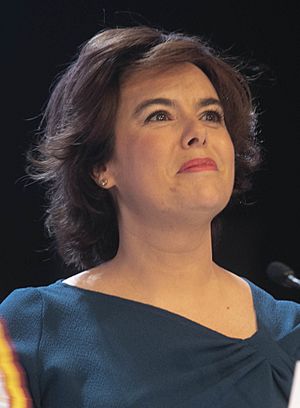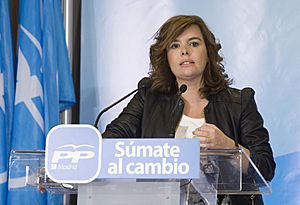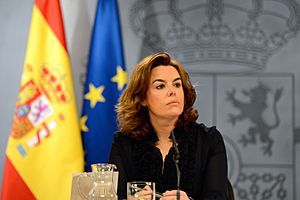Soraya Sáenz de Santamaría facts for kids
Quick facts for kids
The Most Excellent
Soraya Sáenz de Santamaría
|
|
|---|---|
 |
|
| Deputy Prime Minister of Spain | |
| In office 21 December 2011 – 7 June 2018 |
|
| Prime Minister | Mariano Rajoy |
| Preceded by | Elena Salgado |
| Succeeded by | Carmen Calvo |
| Minister of the Presidency of Spain | |
| In office 21 December 2011 – 7 June 2018 |
|
| Prime Minister | Mariano Rajoy |
| Preceded by | Ramón Jáuregui |
| Succeeded by | Carmen Calvo |
| Spokesperson of the Government of Spain | |
| In office 21 December 2011 – 3 November 2016 |
|
| Prime Minister | Mariano Rajoy |
| Preceded by | José Blanco López |
| Succeeded by | Íñigo Méndez de Vigo |
| Member of the Congress of Deputies | |
| In office 13 May 2004 – 10 September 2018 |
|
| Constituency | Madrid |
| Personal details | |
| Born |
María Soraya Sáenz de Santamaría Antón
10 June 1971 Valladolid, Spain |
| Political party | People's Party |
| Spouse | Iván Rosa (2006–present) |
| Children | 1 |
| Education | University of Valladolid |
| Occupation | Politician, state lawyer |
| Signature |  |
María Soraya Sáenz de Santamaría Antón (born 10 June 1971) is a Spanish former politician. She was a key member of the People's Party. From 2011 to 2018, she served as the Deputy Prime Minister of Spain. This role is like being the second-in-command to the Prime Minister. She was also the Minister of the Presidency. She represented Madrid in the Congress of Deputies (Spain's main law-making body) from 2004 to 2018.
Contents
Soraya Sáenz de Santamaría's Life and Career
Early Life and Education
Soraya Sáenz de Santamaría was born in Valladolid, Spain, in 1971. She was the only child of Pedro Sáenz de Santamaría and Petra Antón.
She studied Law at the University of Valladolid from 1989 to 1994. She was an excellent student. She graduated with top honors, being first in her class. She even received a special award from the university for her amazing academic record.
After university, she passed a very difficult public exam. This allowed her to join the State Lawyers Corps. This is a special group of highly skilled lawyers who work for the Spanish government. In 2005, Soraya married José Iván Rosa Vallejo. They have one son, who was born in November 2011.
Beginning Her Political Journey

In 2000, Soraya began working in politics. She became an advisor to the office of the First Vice-president of the Government. This role was in the Ministry of the Presidency and the Ministry of Home Affairs.
From 2004 to 2008, she worked as a secretary for the People's Party (PP). She was in charge of the party's policies for different regions and local areas.
She became a candidate for the Congress of Deputies in 2004. Even though she wasn't elected at first, she became a deputy (a member of parliament) in May 2004. She took over a vacant seat. Later, in 2008, Mariano Rajoy chose her to be the main spokesperson for the People's Party in the Congress of Deputies.
A Key Role in the Government

In 2011, the People's Party won a large majority of seats in the election. Mariano Rajoy became the Prime Minister. He then chose Soraya Sáenz de Santamaría to be the Deputy Prime Minister of Spain. She also became the Spokesperson for the government in December 2011.
Soraya Sáenz de Santamaría served in Rajoy's government for many years. She was the Deputy Prime Minister and Minister of the Presidency from 2011 to 2018. She was also the Government Spokesperson from 2011 to 2016. For a short time, she also managed the Ministries of Health and Justice.
In October 2017, the Spanish government took special control over the Catalan government. This happened after a political crisis. Soraya Sáenz de Santamaría was given the job of overseeing the functions of the Catalan government during this time.
Running for Party Leadership
In June 2018, Mariano Rajoy's government lost a vote of no confidence. This meant he had to step down as Prime Minister. He also decided to resign as the leader of the People's Party. Soraya Sáenz de Santamaría then decided to run for the party's top leadership role.
She was one of the main candidates. In the first round of voting among party members, she came in first place. However, in the final vote among party delegates, she lost to Pablo Casado. After this, in September 2018, Soraya Sáenz de Santamaría announced that she was leaving politics after 18 years.
After Politics
After leaving politics, Soraya Sáenz de Santamaría continued to serve her country in other ways. In October 2018, she was appointed as a member of the Spanish Council of State. This is a very important group that advises the Spanish Government. She started this new role in November 2018. In March 2019, it was announced that she would also join the Cuatrecasas law firm. She became both an associate and a member of their board of directors.
Political Views and Style
Many news outlets have called Soraya Sáenz de Santamaría "the most powerful woman in Spain" during her time in politics. She was often seen as someone who focused on practical solutions and good management. She was not always closely involved with the main party leadership. Instead, she built her political influence outside of the party's inner circle. She was generally considered to represent the more moderate side of the People's Party.
Images for kids
See also
 In Spanish: Soraya Sáenz de Santamaría para niños
In Spanish: Soraya Sáenz de Santamaría para niños
 | Aurelia Browder |
 | Nannie Helen Burroughs |
 | Michelle Alexander |




